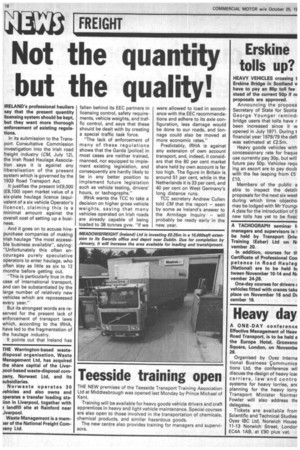Not the quantity but the quality!
Page 20

If you've noticed an error in this article please click here to report it so we can fix it.
IRELAND's professional hauliers say that the present quantity licensing system should be kept, but they want more thorough enforcement of existing regulations.
In its submission to the Transport Consultative Commission investigation into the Irish road freight industry (CM, July 12), the Irish Road Haulage Association says it is against any liberalisation of the present system which is governed by the 1933 Road Transport Act.
It justifies the present 1r£9,000 (£8,100) open market value of a six-plate haulage licence (equivalent of a six vehicle Operator's licence), claiming this is a minimal amount against the overall cost of setting up a business.
And it goes on to accuse hirepurchase companies of making Irish haulage "the most accessible business available", saying: "Unfortunately this often encourages purely speculative operators to enter haulage, who often stay as little as six to 12 months before getting out.
"This is particularly true in the case of international transport, and can be substantiated by the large number of relatively new vehicles which are repossessed every year."
But its strongest words are reserved for the present lack of enforcement of transport laws which, according to the IRHA, have led to the fragmentation of the haulage industry.
It points out that Ireland has THE Warrington-based wastedisposal organisation, Waste Management Ltd, has acquired the share capital of the Liverpool-based waste-disposal company, Norwest Ltd, and its subsidiaries.
Norwaste operates 30 vehicles and also owns and 3perates a transfer loading station in Liverpool, together with s landfill site at Rainford near _iverpool.
Waste Management is a mem)er of the National Freight Corn)any Ltd. fallen behind its EEC partners in licensing control, safety requirements, vehicle weights, and traffic control, and says that these should be dealt with by creating a special traffic task force.
"The lack of enforcement of many of these regulations shows that the Garda [police] in most cases are neither trained, manned, nor equipped to implement existing legislation, and consequently are hardly likely to be in any better position to implement future legislation such as vehicle testing, drivers' hours, or tachographs."
IRHA wants the TCC to take a decision on higher gross vehicle weights, saying that many vehicles operated on Irish roads are already capable of being loaded to 38 tonnes gvw. "If we were allowed to load in accordance with the EEC recommendations and adhere to its axle configuration, less damage would be done to our roads, and tonnage could also be moved at more economic rates."
Predictably, IRHA is against any extension of own account transport, and, indeed, it considers that the 80 per cent market share held by own account is far too high. The figure in Britain is around 51 per cent, while in the Netherlands it is 33 per cent, and 40 per cent on West Germany's long distance runs.
TCC secretary Andrew Cullen told CM that the report — seen by some as Ireland's answer to the Armitage Inquiry — will probably be ready early in the new year.
























































































































































